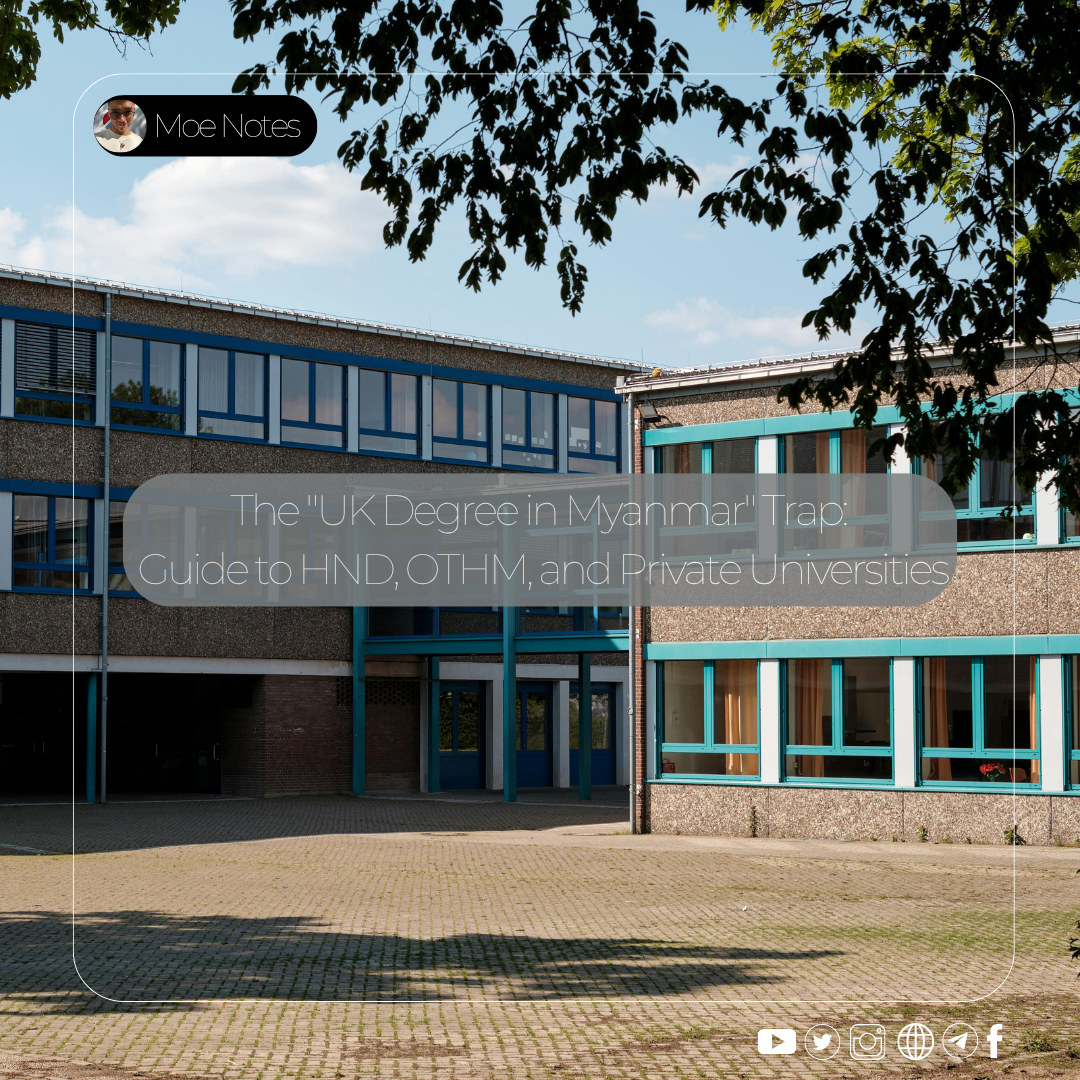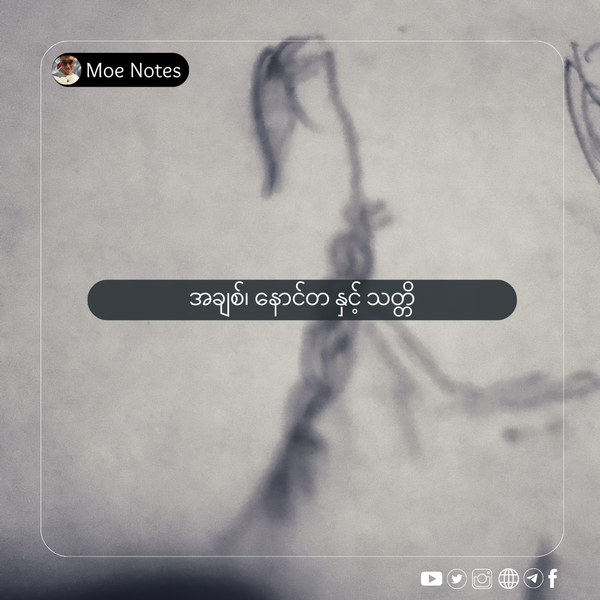The "UK Degree in Myanmar" Trap: A Guide to HND, OTHM, and Private Universities

This article is also available in [Burmese]
"Examining the duration, costs, and critical differences in facilities, faculty, job prospects, and salary between the traditional pathway and local diploma routes."
For students in Myanmar, the path after high school can be confusing. Most international schools only go up to Grade 12, and their graduates cannot enroll in local Burmese universities. The obvious path is to go abroad, but what about those who want an international education without the high cost and distance from family? For them, private universities in Yangon offering foreign degrees have become a popular alternative.
This was especially true until the 2021 coup. Since then, as more students desperately seek a way out, these local pathways have come under intense scrutiny. Students and parents are no longer just asking "Can I get a degree?" They are asking the tougher questions: "Is this degree actually valuable? Will it get me a good job? What are the real differences?" After investing years of time and tens of thousands of dollars, some are finding the answers are not what they were promised.
Part 1: How the "Degree in Myanmar" Pathway Works (And Where It Breaks Down)
This pathway typically involves studying for a UK-based vocational diploma, such as an HND (Higher National Diploma) or an OTHM qualification, at a private centre in Yangon.
- The Model: You study in Yangon for two or three years. Afterwards, you have the option to "top-up" your diploma by studying for one final year at a partner university in the UK. You then graduate with a full Bachelor's degree from that UK university (e.g., "BSc Business and Management from the University of [X]").
- The Catch (The "Bait and Switch"): The critical problem arises at the end of your two years in Yangon. Students often discover that the diploma they worked so hard for is only accepted by a tiny, very specific list of UK universities—the ones the private centre in Yangon has a partnership with.
- The Trap: These partner universities are often not well-known or highly ranked. If you decide you don't want to attend any of the universities on that limited list, you are trapped. Your two years of study are often non-transferable. To apply to other, better universities, you would have to start again from year one, using your original high school qualifications (like IGCSEs). Your diploma becomes worthless.
Part 2: The Opportunity Cost - A Comparison of Pathways
The fundamental difference comes down to freedom and opportunity.
- The Traditional Pathway (A-Levels, OSSD, IB): After completing a recognized Grade 12 equivalent, you have the freedom to apply to almost any university in the world. Your grades and personal statement determine your options. You can apply to top-tier universities, mid-tier universities, and safety schools across multiple countries. Your major choices are virtually limitless.
- The Diploma Pathway (HND/OTHM): Your path is predetermined and severely restricted. Your choices are limited to a handful of partner universities and the few majors they offer for top-up. You lose the freedom to aim higher or change your mind.
Part 3: The Four Critical Gaps - Where the Local Experience Falls Short
Even if you are happy with the limited university choices, there are significant gaps between the experience in Yangon and a proper university education abroad.
- The Major Gap: These diploma programs almost exclusively offer majors that can be taught theoretically in a classroom, like Business and IT. For hands-on, practical majors like my own—Architecture—which require specialized studios, workshops, and access to a specific physical and cultural environment, this model is completely inadequate.
- The Experience Gap: No matter how luxurious a private campus in Yangon may be, it cannot replicate the environment of an established UK university. This includes the centuries-old libraries, the cutting-edge lab facilities, the student societies, and the broader academic culture. (For context, half of the UK's rowing team for the 2024 Paris Olympics came from my university, Oxford Brookes—that's the kind of ecosystem these institutions create).
- The Faculty Gap: The pool of highly qualified, internationally experienced teachers in Myanmar is small and, due to the brain drain, shrinking.
- The Employability Gap: An employer doesn't just see the name of the university on your degree. They see the journey. There is a vast difference in experience, skills, and professional networks between a student who spent three full years immersed in a competitive international environment and one who spent two years in Yangon and only one year abroad.
Part 4: How These Qualifications Are Actually Recognized (The Fact Check)
This is the question that matters most. What is the real value of these diplomas?
- The Official Recognition: Qualifications like the HND (Higher National Diploma), awarded by Pearson, and OTHM qualifications are legitimate, recognized vocational qualifications in the UK. They are not scams in and of themselves. They are designed to provide practical, industry-specific skills and are a valid pathway to a final-year university "top-up."
- The Unofficial Perception (How People See Them): This is the crucial part. While the diplomas are legitimate, their value in the eyes of employers and top universities is highly dependent on two factors:
- The quality of the teaching centre in Myanmar.
- The ranking and reputation of the UK university you do your final-year top-up at. Employers and admissions tutors for Master's programs can easily distinguish between a student who earned their place at a competitive university for a full three-year degree versus one who entered a lower-ranked university for a single year via a diploma top-up. These are widely seen as "non-traditional" or "vocational" routes and, while valid, do not carry the same prestige as the traditional academic pathway.
Part 5: A Student's Guide to Due Diligence and Spotting Scams
The worst actors in this industry are not just misleading; they are predatory.
- Outright Scams: Some centres promise partnerships with foreign universities that don't exist or lead to worthless, unaccredited degrees.
- Unethical Sales Tactics: Being intentionally vague about partner university lists until after you've paid tuition is a major red flag.
- The Online Mob: Be aware that many schools use fake accounts or pressure current students to attack anyone who posts a negative review online, turning professional criticism into a personal drama.
Before you sign up, ask these sharp questions:
- "Can you show me the exact, official list of UK universities that accepted last year's graduates from this specific diploma?"
- "Is this diploma transferable to universities that are NOT on your partner list?" (The answer is almost always no).
- "Can you put me in private contact with a recent graduate of this program?"
Conclusion: A Final Thought
There is a place for these diploma programs. For a student whose goal is simply to get a foreign degree for the lowest cost and is not concerned with university rankings or having a wide range of choices, they can be a viable option.
However, for those who are aiming for a high-quality, globally competitive education, the traditional pathway offers incomparably more freedom, opportunity, and long-term value. Do your research, understand the trade-offs, and choose the path that aligns with your true ambitions



